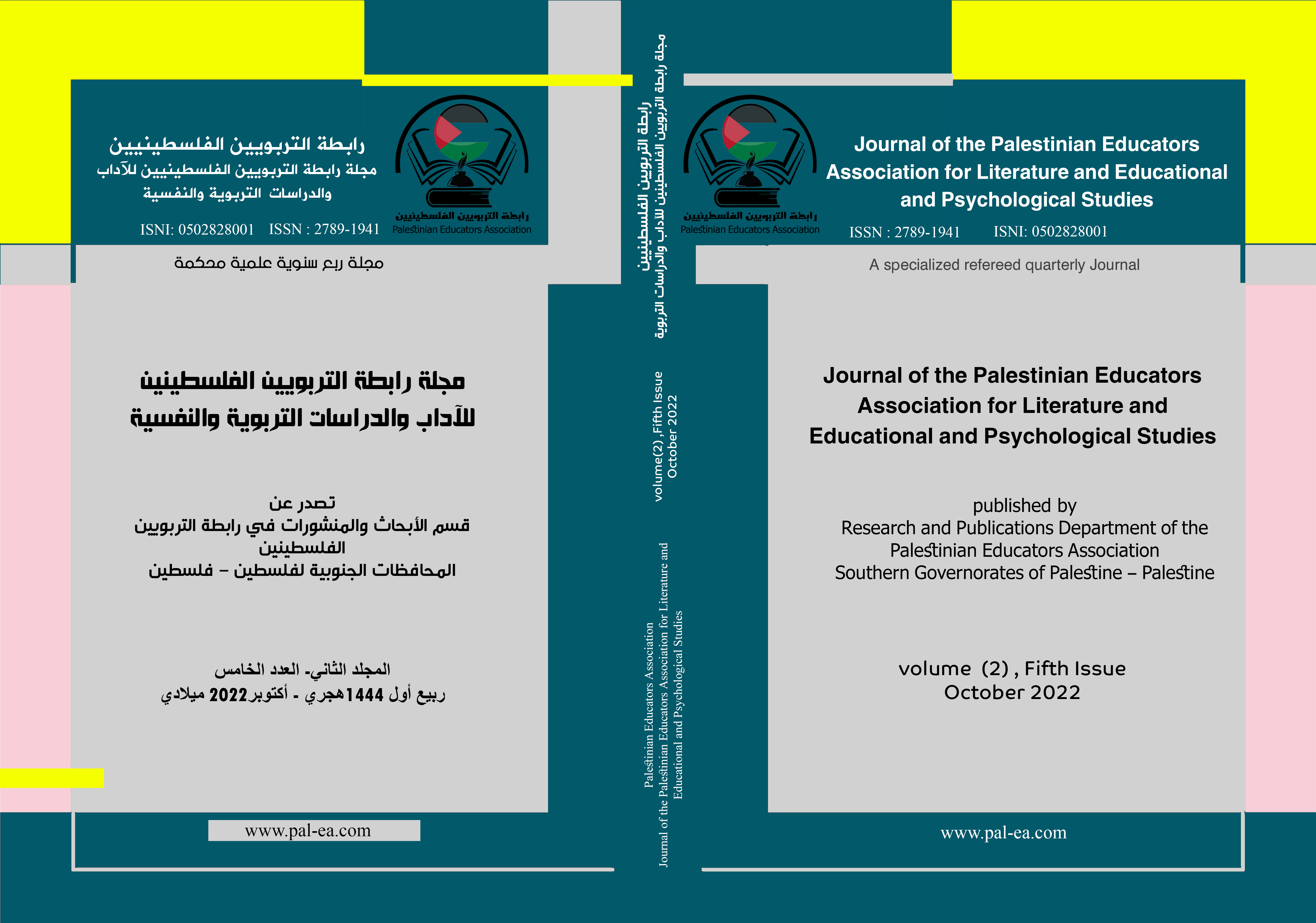تطوير تقنية التقويم التوافقي كاتجاه حديث للتقويم البديل للموهبة والإبداع في المملكة العربية السعودية
DOI:
https://doi.org/10.69867/PEAJ057الكلمات المفتاحية:
الموهبة، الإبداع، تقويم الأداء، حقيبة الإنجاز، التقويم الذاتيالملخص
يسلط التقويم البديل للموهوبين والمبدعين الضوء على الاتجاهات الحديثة لاكتشاف وتقويم الموهوبين متبنياً معياراً متعدداً، ويرتكز على الأداء الحقيقي أساساً له، وتهدف الدراسة الحالية تأسيس إطار نظري للتقويم البديل للموهوبين والمبدعين يتناول أهدافه وخصائصه والمقارنة بينه وبين الأساليب التقليدية بالإضافة إلى أدوات وأساليب التقويم البديل، وتهدف الدراسة أيضاً بشكل أساسي إلى تقنين تقنية التقويم التوافقي لتقويم منتجات الطلاب الموهوبين والمبدعين وإعدادها لتكون صالحة للاستخدام في المملكة العربية السعودية، تسعى الدراسة الحالية لتوضيح المفاهيم المرتبطة بالتقويم البديل وخصائصه وطرائقه بالٌضافة لميزاته وعيوبه بشقها النظري، أما بالشق العملي فتسعى الدراسة الحالية إلى تقنين تقنية التقويم التوافقي كأحد طرائق التقويم البديل لمنتجات وابتكارات الطلاب الموهوبين والمبدعين، وتقويم تقنية التقويم التوافقي.
التنزيلات
المراجع
المصادر والمراجع
أولاً: المراجع العربية:
القفاص، وليد. (2011). التقويم والقياس النفسي والتربوي اتجاهات معاصرة – برامج تدريبية – نماذج لإعداد وتعريب الاختبارات، المكتب الجامعي الحديث. مصر.
أرمسترونج، ثوماس. (2006). الذكاءات المتعددة في غرفة الصف. دار الكتاب التربوي: الدمام).
الخليلي، خليل. (1998). التقييم الحقيقي في التربية. مجلة التربية. (126)،118.
زيتون، حسن. (2003). أصول التقويم والقياس التربوي المفهومات والتطبيقات. الدار الصولتية: الرياض.
سرايا، عادل. (2001). التقويم الحقيقي. مجلة التدريب والتقنية. (74)،40.
علام، صلاح الدين. (2000). التقويم التربوي البديل. دار الفكر التربوي: القاهرة.
مهيدات، عبد الحكيم ؛ المحاسنة، ابراهيم. (2009). التقويم الواقعي. دار جرير، عمان.
المراجع العربية الإنجليزية
Al-Qaffas, W. (2011). Psychological and Educational Assessment and Measurement: Contemporary Approaches, Training Programs, and Models for Test Development and Localization (In Arabic). Modern University Office. Egypt.
Armstrong, T. (2006). Multiple Intelligences in the Classroom (In Arabic). Educational Book House. Dammam.
Al-Khalili, K. (1998). Authentic Assessment in Education. (In Arabic). Journal of Education, (126), 118.
Zeitoon, H. (2003). Principles of Educational Evaluation and Measurement: Concepts and Applications (In Arabic). Dar Al-Sawlatiya. Riyadh.
Sraya, A. (2001). Authentic Assessment. (In Arabic). Journal of Training and Technology, (74), 40.
Allam, S. (2000). Alternative Educational Evaluation (In Arabic). Educational Thought House. Cairo.
Mahaydeh, A. H., & Al-Mahasneh, I. (2009). Realistic Evaluation. (In Arabic). Jarir Publishing, Amman.
ثانياً: المراجع الأجنبية:
Baska, V.T. (2007). Alternative assessments with gifted and talented students. Waco, TX: Prufrock Press.
Birenbaum, M. and Dochy, F. (1996). Alternative Assessment of Achievements, Learning Processes and Prior Knowledge. Boston; Kluwer Academic Publishers.
Borland, J, H (2003) Rethinking gifted education, published by teacher college press. New York.
Bond, L.A. (1994): Critical Issue: Rethinking assessment and its role in supporting educational reform, North Central Regional Educational Laboratory.
Callahan, C.M. (2002). The ABCs of creating a performance assessment task and scoring rubric. Gifted Education communicator, 33(2), pp. 12-15.
Carson, S. (2006). Creative and Mental Illness. Invitational Panel Discussion Hosted by Yale's Mind matters Consortium, New Haven, CT.
Denham, A &Lahm, E.A(2001). Using technology to construct alternate portfolios of students with moderate and severe disabilities . Teaching Exceptional Children,33/5.
Hill, C. (2000). The progress profile: Constructivist Assessment in early childhood education. In A.L. Costa (Ed) Teaching for intelligence II (pp.211-230) Chicago: Skylight Publishing.
Lane, S., & Stone, C. A. (2006). Performance assessment. In R. L. Brennan (Ed.), Educational Measurement (4th ed.), (pp. 387-432). National Council on Measurement in Education & American Council on Education. Westport, CT: Praeger Publishers.
Lohman, D. F. (2005). The role of nonverbal ability tests in identifying academically gifted students: An aptitude perspective. Gifted Child Quarterly, 49, 111-138.
Runco, M.A., Illies, J.J., & Reiter- Palmon, R. (2005). Explicit instructions to be creative and original: A comparison of strategies and criteria targets with three types of divergent thinking test, Korean journal of thinking and problem solving, 15, pp.5-15.
Runco, M.A, & Dow, G.T. (2004). Assessing the accuracy of judgment of thinking and problem solving, 14, pp.5-14.
Schlepphege, J. (2010(. The Portfolio: An Alternative assessment method in the foreign language, Seminar paper, Grin. Pub.
Seidel, S. (2006). Project zero /Massachusetts school network. Retrieved December 13,2006, from http://www.pz.harvard.edu/Research/MSN.htm.
Shaklee, B.D., &Viechnicki, K. (1995). A qualitative approach to portfolios: the early assessment foe exceptional potential design, Journal for the Education of the gifted, 18, 156-170
Shivinina, L (2003) The international handbook on innovation, Elsevier science Ltd.
Wiggins, G. (1993). Assessing student performance: Exploring the purpose and limits of testing. New York: Jossey – Bass.
منشور
إصدار
القسم
الرخصة

هذا العمل مرخص بموجب Creative Commons Attribution-NonCommercial-ShareAlike 4.0 International License.
مجلة رابطة التربويين الفلسطينيين للآداب والدراسات التربوية والنفسية
الرقم الإلكتروني: 1941-2789
احتفاظ المؤلفين بحقوق الطبع والنشر
تسمح مجلة رابطة التربويين الفلسطينيين للآداب والدراسات التربوية والنفسية للمؤلفين بالاحتفاظ بحقوق الطبع والنشر ومنح المجلة حق النشر الأول مع العمل المرخص في نفس الوقت بموجب ترخيص Creative Commons Attribution (CC-BY) 4.0 الذي يسمح للآخرين بمشاركة العمل مع الاعتراف بتأليف العمل ونشره الأولي في هذه المجلة.
بشرط أن يكونوا أصحاب حقوق الطبع والنشر لعملهم، يستطيع المؤلفون الدخول في ترتيبات تعاقدية منفصلة وإضافية للتوزيع غير الحصري للنسخة المنشورة من العمل في المجلة (على سبيل المثال، نشرها في مستودع مؤسسي، في مجلة) أو نشره في كتاب) مع شكر على نشره الأولي في هذه المجلة.
يُسمح للمؤلفين ويتم تشجيعهم على نشر أعمالهم عبر الإنترنت (على سبيل المثال، في المستودعات المؤسسية، أو المستودعات الصارمة، أو على موقع الويب الخاص بهم) قبل وأثناء عملية التقديم.










